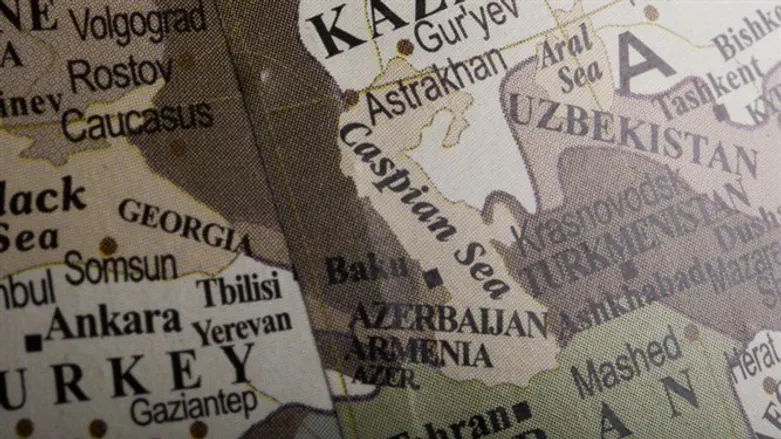
The late-January report stated that last fall’s six-week war over the Nagorno-Karabakh region “has led to an alarming rise in the level of anti-Semitism on the part of the Armenians, which has come amid criticism of political cooperation and security trade between Israel and Azerbaijan.” That political criticism, the report explained, “was soon replaced by attacks on ethnic-religious groups and accusations against Jews of alleged historical and contemporary crimes against the Armenian people.”
The Israeli government’s official acknowledgment of Armenian anti-Semitism underscored a trend in Armenia’s society that often flies under the radar.
Armenia came under scrutiny in May 2016 for erecting a monument in Yerevan honoring Nazi collaborator Garegin Nzhdeh, commander of the Armenian Legion, a unit which fought in Crimea, the Caucasus, and southern France as the Nazis rounded up Jews and resistance fighters and marched them to death camps. Nzhdeh was convicted for war crimes and sentenced to 25 years in prison by a Soviet court. But the recent report in The Forward documented that Armenia’s glorification of Nzhdeh extends far beyond Yerevan. Besides the Yerevan monument, Nzhdeh is honored through a statue in Gyumri, Armenia’s second-largest city; a street and memorial in Kapan; and streets in 16 other municipalities.
The contrast is unmistakable and a telltale sign of Armenian anti-Semitism: While Armenia widely glorifies a notorious Holocaust-era war criminal, a memorial to victims of the Holocaust in the country’s capital is desecrated.
Despite Armenia’s lionization of Nazi collaborators, Armenian Prime Minister Nikol Pashinyan has “accused Israel of supporting genocide” in a critique that draws “motifs from the Holocaust,” the Israeli ministry’s new report noted.
Pashinyan told The Jerusalem Post last November that Azerbaijan is “carrying out genocide against Armenians in Nagorno-Karabakh,” and promoted the unsubstantiated claim that “Syrian mercenaries” were fighting against Armenians. At the time, media reports had published photos of Syrian fighters in Libya together with articles about the war in Nagorno-Karabakh.
“Mercenaries, Islamic terrorists, and Israel are now on the same side basically. So, Israel should think, is this really a convenient position for it to be?” Pashinyan said.
The Armenian leader’s sharp rhetoric reflects the Israeli government report’s observation that the Nagorno-Karabakh war “led to expressions of significant ‘new anti-Semitism’ in the form of disproportionate criticism of the State of Israel.”
“The many media reports noting that Israel is supplying weapons to the Azerbaijani army have provoked much outrage among the Armenian population, and anti-Semitic chants have been heard in some of the demonstrations held in Armenia,” added the report.
In November, Pashinyan also said that “hybrid warfare can be manifested in different ways — it can be manifested in ways which we see in Nagorno-Karabakh, or in ways in which we are seeing in Vienna, or in Nice, in France.” During the same week, Pashinyan had tweeted after the attack on Jewish targets in Vienna, “#NagornoKarabakh has been fighting against the Azerbaijani-Turkish terrorist tandem for over a month now. I share the grief of the people of Austria, wish patience to the families of the victims, and a speedy recovery to those wounded.”
While Pashinyan sought to score cheap political points with the Jewish community by exploiting the anti-Semitic attack in Vienna, research on Armenian society exposes the prime minister’s hypocrisy. Armenians (58 percent) believe in a series of anti-Semitic stereotypes at an event higher rate than Iranians (56 percent), according to the Anti-Defamation League. Additionally, a Pew Research Center survey found that 32 percent of Armenians would not accept Jews as fellow citizens. It should therefore come as no surprise to find Nazi collaborator monuments situated throughout Armenia — and along the same lines, it is also no shock to see the unfortunate vandalization of the Holocaust memorial in Yerevan.
Today, Israel has an opportunity to reinforce these realities on a policy level as it navigates its approach to the Armenia-Azerbaijan conflict. In an ongoing effort to pressure the Jewish state into diminishing its pioneering relationship with a Muslim-majority nation, Armenia is likely to repeat actions such as recalling its ambassador to Israel over arms sales to Azerbaijan.
Yet by acknowledging the chronic issue of Armenian anti-Semitism, the Ministry of Diaspora Affairs has affirmed Israel’s awareness about the potential pitfalls of ties with Armenia. Accordingly, Jerusalem can be expected to proceed cautiously vis-à-vis Yerevan and to expand relations with Baku in defiance of Armenian pressure.
Paul Miller is president and executive director of the news and public-policy group Haym Salomon Center. Follow him on Twitter at @pauliespoint.